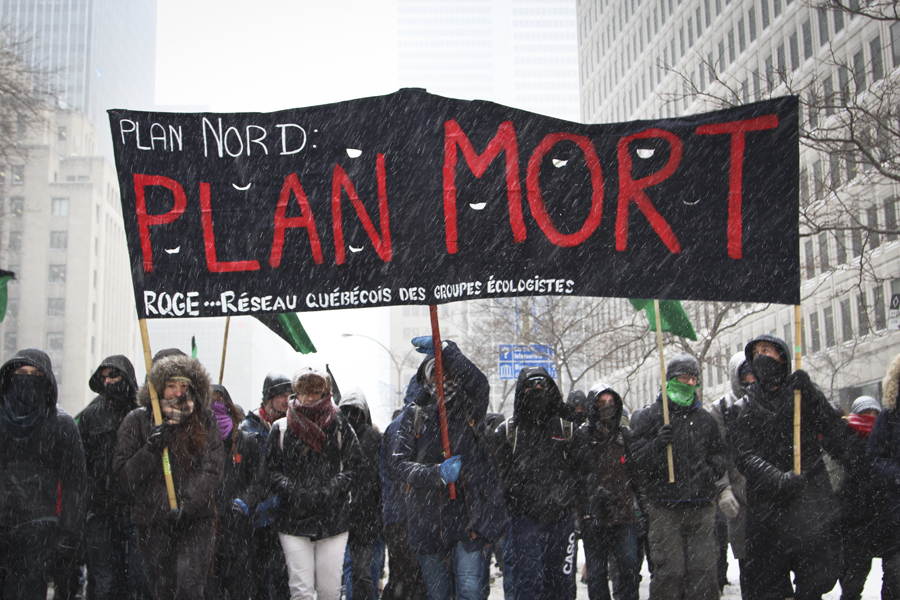Last Friday, about 200 students, activists, and other Montreal citizens braved the snow to gather in Victoria Square to protest against the Quebec government’s Plan Nord, a project intended to develop the mining, tourism, and lumber industries in northern Quebec.

Protestors marched to the Palais des Congrès, where a job fair on employment in the natural resources industry was taking place in the convention centre. The Service de police de la Ville de Montréal (SPVM) immediately declared the protest illegal for violating Law 12, which states that the organizers of a protest must file a street plan with the police in advance.
Riot police officers told protestors to disperse after several protesters sprayed graffiti on police cars and buildings, and set off small fireworks. According to The Montreal Gazette, protestors also broke a window of the Palais des Congrès.
Étienne Brossard, a student at Montreal’s L’École de technologie supérieure who attended the protest, said most of his criticism against Plan Nord relates to the mining companies and the project’s ramifications for the environment.
“The environmental consequences are so bad, that when the world looks at Canada and Quebec, they will say that this country does not care about the environment,” he said.
According to the Parti Québécois (PQ), Plan Nord is intended to be the world’s largest economic development plan in recent generations. Launched in 2011 by the former Liberal government, the project is estimated to bring in over $80 billion in investment, as well as creating or consolidating over 20,000 jobs annually over a 25-year implementation.
While the government promises that environmental protection is a primary goal in their decision-making, many have criticized the project for encouraging industrial development at the expense of the environment. Critics have also spoken out against the project for showing a lack of respect for Indigenous land rights.

One protestor, who asked to remain anonymous, carried a green and black flag that he said represented “ecological anarchism.” He encouraged people to be more aware of the effects of Plan Nord.
“It doesn’t have to directly affect me—the problem is that everyone is just waiting for these things to affect us,” he said. “It will directly affect all of us soon enough when they choke up the rivers, [and] when we have more ecological disasters.”
Benedict Boyle, a Montreal citizen who attended the protest, argued that the public has not been properly informed of everything
involved in Plan Nord.
“There was a lack of consultation with the people,” he said. “[The project] is very nearsighted, [intented] just to make capital gain.”
Boyle said he also believes that the decision-making involved in the plan was “biased,” and not made with adequate attention to the younger generation.
“When people are involved in it for the money, and not for the future, it will affect everyone,” Boyle said.
Robin Reid-Fraser, vice-president external of the Students’ Society of McGill University (SSMU), said up to several hundred McGill students planned to attend Friday’s protest. She said McGill students often have conflicting views towards Plan Nord, due to the many details involved in the plan.
“A lot of students have concerns with Plan Nord, mostly for environmental reasons, or what it’s going to mean for Indigenous sovereignty around the land,” Reid-Fraser said. “Others might think it is a [beneficial] opportunity for resource expansion and economic development.”
Another protest against Plan Nord was held on Saturday morning outside the Palais des Congrès, where Friday’s forum was continuing. Saturday’s protest was also deemed illegal by the Montreal police because the route was not previously disclosed. Riot police dispersed the crowd of several hundred protestors, and arrested at least 30 people, according to CTV.









